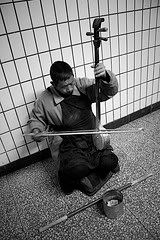
One of the signature characteristics of music production today is sampling, which is a process wherein a musician takes a short recording – such as a guitar lick or snare drum hit – originally created by someone else and then uses that recording in a new composition.
I think a lot of people have heard of sampling in the hip hop sense, where a rapper will loop 2 bars of the groove from an old funk or r&b hit, record his/her own lyrics over the top and suddenly achieve fleeting megafamosity (see Hammer, M.C.).
In 2009, however, both the technology and the ethos of sampling are part of daily life for many people, not just pop stars, and though the ubiquity of sampling has many important cultural ramifications, the most important point for music makers (like me) is this:
I have a small silver box on my desk that contains every sound in the world, and I know how to use it.
Every music-making computer program comes with its own library of samples, from disco horn stab to choral chant to subway rumble to that noise that a toaster makes when it pops up, and you can play each of these sounds as easily as playing a piano. Only since you’re playing a subway, you don’t even really have to know how to play (no one knows how to play a subway!).
What does this mean for your everyday basement rock star, and the people who listen to her/him (hi mom)? Well, it often means that when recording and in pursuit of that elusive “thing” that you need to make your song special, it’s a lot easier to open up some computer folders and start digging for an interesting sound than it is to write a compelling countermelody, or arrange a string part.
Downside: fewer Beatles-level triple-crown melodic/harmonic/rhythmic masterpieces.
Upside: now I know how my chorus sounds when sung by goats!
Anyway, this is all a really roundabout way of taking another look at the track I’ve been working on and blogging about, and answering the following question:
Why is there an erhu on my song?
Can I play an erhu? No.
Do I have an erhu? No.
Have I even ever seen an erhu? N-wait a minute, yes I have! Several years ago there was an elderly Chinese man who regularly showed up in the breezeway in Lower Sproul Plaza, on the UC Berkeley campus. He was always playing an unusual double-stringed instrument with a bow, and it made a very tragic, vocal sound. At some point I became sufficiently intrigued to go to the library (pre-Google, folks) and discover that it was in fact an erhu, or ancient Chinese fiddle.
Fast-forward to early January. I’m sitting as close as possible to the space heater in my under-insulated music lair, trying to breathe some inspiration into the surprisingly inert recording of the song that I’d only finished writing a couple of days before (I was excited about it then. What’s wrong with it now? How did it get so boring? I’m an idiot.). I’ve tried a new, Nashville-strung guitar part. I’ve tried delicate piano filigree. I’ve attempted an intricate melodic tom pattern on the drums (but was foiled by the fact that I can’t really play drums).
Sigh. I guess I’ll have to cheat. Down, down into the nested folders I go, past singing Tibetan bowls and calf-skin djembes, lightly-whacked colanders and air raid sirens, Brazillian berimbaus and two-stroke lawnmowers…. nopenopenopenope. “Composing” this way feels about as musical as singing the Dewey Decimal System.
It can and does work, though. After about an hour of this, I came across the “erhu” folder, felt a faint tug of recognition from the word, figured what the hell, loaded up the sound…and damned if that wasn’t just what the song needed!
Erhu – who knew? The chorus glowed with a strange aural nimbus, and suddenly I had a living song again. Thanks, old Chinese man!
[audio:erhu.mp3]
Wow, who would’ve known. It’s so crazy how the erhu survived throughout Chinese history. I mean, it has only two strings, but I guess they appreciated something there, which paid off since it’s sound is so distinct to China.
Yeah – pretty amazing how much soul they can get out of only two strings. Great photo, btw!
i know that guy. i bought his cd. no kidding. not sure where it is right now or i’d lend it to you. i think his name was mr. lee.
dont look at it as cheating, look at it as sharing.
and if you can’t count on an old chinese man to break you out of a mini-slump, then who can you count on?
you should check out these modern bands that uses the Erhu in their music.
Hsu-nami a rock instrumental band they uses Erhu as the lead instrument (melody, solos, everything) in their progressive instrumental songs.
http://www.hsu-nami.com
http://www.myspace.com/hsunami
I heard the Extreme metal band Chthonic from Taiwan (toured Ozzfest 2007) they have Erhu player as rhythm or take place of the background music, similar to keyboard.
http://www.chthonic.org
http://www.myspace.com/chthonictw
Hey James:
Thanks for the tip – I’ll definitely check them out!